What is a Business Support System (BSS)?
The BSS stands for Business Support System, it typically covers the Customer facing and Business parts and works closely with the Operating Support Systems (OSS). The BSS is a very important part of your Mobile Brand (MVNO) and IOT Business.
What do you need to know about the BSS?
- What is the function of the BSS?
- What are the 4 key parts of the BSS?
- What is the Synergy of BSS Components?
- What Impact has IoT on the BSS?
- What Impact does Mobile have on the BSS?
- What Things are Special for IoT in relation to a BSS?
- What are the Main Differences Between a BSS for IoT and for Mobile?
- What is the best BSS?
- What is the main difference between BSS and OSS?
- Summary of what is a Business Support System BSS?
What is the Function of the Business Support System (BSS)?
Business Support System (BSS) refers to the set of applications, modules and software programs that allow telecommunications organizations to manage and streamline all customer-facing activities—from ordering services to resolving billing issues. The BSS mainly caters to processes of product management, order management, Billing & Revenue management, and customer management.
These components work synergistically to deliver efficient services, maintain strong customer relationships, and ensure financial viability. Digital BSS, however, can support 5G monetization, enabling BSS to support hybrid networks and ensuring heterogeneity across these journeys.
A well-structured BSS framework is essential for telecommunications and service providers to efficiently manage their business operations and enhance customer experiences. Below, we will explore the four primary parts of BSS, emphasizing their functions, importance, and interconnections.
From a Mobile Brand / MVNO /IOT point of view the BSS sits in the top, above the Operating Support System (BSS) and the Core Mobile Network.
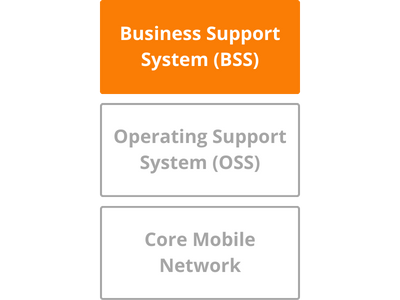
What are the 4 key parts of the Business Support System (BSS)?
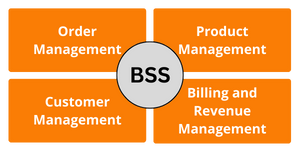
Business Support System (BSS) have an important role in your Mobile Brand and the MVNO landscape, focusing on the business aspects of customer management , billing and revenue management, order & product management network management.
BSS contains a suite of software applications, tools, and processes designed to ensure the efficient functioning of customer and business services. In this comprehensive exploration, we will dissect BSS into its four primary components, shedding light on their intricacies and significance.
Customer Management
- The Customer Management itself
- What are the key functions of Customer Management within a BSS?
- What is the importance of Customer Management within the BSS?
- Integration with Other BSS Components
Order Management
- Order Management
- What are the key functions of Order Management within the BSS?
- What is the importance of Order Management within the BSS?
- Integration with Other BSS Components
Billing and Revenue Management
- Billing and Revenue Management
- What are the key functions of Billing & Revenue Management in the BSS?
- What is the importance of Billing and Revenue Management in the BSS?
- Integration with Other BSS Components
Product Management
- Product Management
- What are the key functions of Product Management within the BSS?
- What is the importance of Product Management within the BSS?
- Integration with Other BSS Components
Customer Management
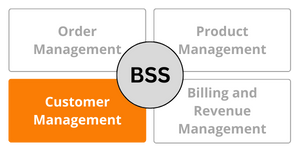
The Customer Management of the BSS itself
Customer Management is the keystone of BSS, as it revolves around cultivating and nurturing meaningful relationships with customers. In a highly competitive telecommunications landscape, where customers have an array of choices, effective Customer Management is indispensable.
It encompasses a spectrum of functions aimed at delivering superior customer experiences and ensuring customer satisfaction.
The key functions of Customer Management within a Business Support System (BSS)
Customer Data Management
The foundation of CRM lies in collecting, storing, and managing comprehensive customer data. This includes personal information, service subscriptions, communication preferences, and interaction history.
Customer Profiling
Profiling involves segmenting customers based on various attributes, such as demographics, usage patterns, and behaviors. These profiles enable personalized service offerings and targeted marketing campaigns.
Interaction Tracking
CRM systems meticulously record customer interactions across various touchpoints, including phone calls, emails, chat support, and social media. This information provides valuable insights for improving customer engagement.
Customer Communication
CRM platforms support personalized communication with customers, whether it’s sending targeted promotions, notifications, or service updates. Effective communication fosters trust and loyalty.
Customer Support
CRM facilitates efficient customer support by streamlining issue tracking, resolution, and follow-up. It ensures that customer inquiries are handled promptly and satisfactorily.
Customer Feedback Management
Capturing customer feedback through surveys, feedback forms, and reviews is crucial for
Some other functions of Customer Management
- Subscriber registration and management
- Subscription Management
- Customer profiling and segmentation
- Self-Service Portals
- Device Management
- Quality of Experience (QoE) Monitoring
- Customer Contact (IVR)
- Customer Loyalty Programs
- Customer Education and Support
- Inbound & Outbound Sales
- API Management
- Marketing and Promotions
- Social Media Management
- Data Monetization
- Customer Privacy and Data Protection
The importance of CRM within the Business Support System (BSS)
CRM is instrumental in fostering long-lasting customer relationships, which are essential for business sustainability. By understanding customer preferences and addressing their needs, service providers can reduce churn rates, increase customer retention, and enhance brand loyalty. CRM also empowers providers to anticipate customer requirements, making it a strategic asset for business growth.
Integration with Other BSS Components
CRM is intrinsically interconnected with other BSS components. For instance, customer data stored in CRM systems is utilized by billing systems to generate accurate invoices. It also informs product management decisions, allowing providers to tailor services to specific customer segments. Furthermore, CRM plays a pivotal role in customer support, helping agents access customer information efficiently and deliver a personalized experience.
Billing and Revenue Management
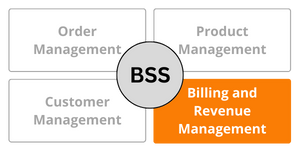
Billing and Revenue Management
Billing and Revenue Management is the financial heartbeat of BSS, ensuring that service providers accurately calculate charges, generate bills, and manage revenue streams. Precision in billing is vital for revenue collection, financial stability, and adherence to regulatory standards.
This component comprises a series of intricate processes to handle the financial aspects of service provisioning.
The key functions of Billing and Revenue Management within the BSS?
Rating
Rating involves the calculation of charges for services based on predefined rate plans, usage, and other parameters. It determines the cost of services consumed by customers.
Charging
Charging mechanisms define how customers are billed for services, whether it’s a prepaid or postpaid model, flat-rate charges, or usage-based fees.
Billing
Billing systems generate invoices that detail the charges incurred by customers during a specific billing cycle. Invoices include itemized charges, payment due dates, and account summaries.
Invoicing
Invoicing encompasses the process of delivering bills to customers through various channels, such as email, postal mail, or online portals. Timely invoicing is crucial for revenue collection.
Payment Processing
This function manages the receipt and processing of customer payments through multiple payment methods, including credit cards, bank transfers, and electronic wallets.
Revenue Assurance
Revenue assurance strategies identify and mitigate revenue leakage, which can occur due to billing errors, fraud, or discrepancies in financial transactions.
Revenue Reconciliation
This process reconciles financial records with partner networks, ensuring accurate revenue sharing and settlement, especially in cases of roaming or interconnection.
Some other functions of Billing and Revenue Management
- Fraud Management
- Campaign Management
- Usage Analytics and Reporting
- Fair usage policy
- Real-time usage & transaction
- Bill shock prevention
The importance of Billing and Revenue Management within the BSS?
Billing and Revenue Management is the financial backbone of service providers. Accurate billing and revenue collection are essential for maintaining the economic viability of the business. It not only ensures the timely collection of funds but also plays a critical role in regulatory compliance and financial reporting.
Integration with Other BSS Components
Billing and Revenue Management is closely intertwined with CRM, as it relies on customer data to generate invoices accurately. It also collaborates with product management to incorporate new service offerings into billing systems. Moreover, it interacts with order management to ensure that services are provisioned according to billing specifications.
Order Management
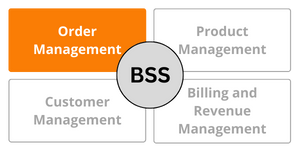
Order Management in the BSS
Order Management is the linchpin for orchestrating service provisioning in response to customer requests. It ensures that customer orders for new services, changes to existing services, and service activations are processed efficiently and accurately.
This component is essential for delivering services promptly and meeting customer expectations.
The key functions of Order Management within the Business Support System (BSS)
Order Entry
Order management begins with the entry of customer orders into the system. This involves capturing order details, such as service types, quantities, and customer preferences.
Order Tracking
Order tracking provides real-time visibility into the status of customer orders. Customers and service providers can monitor the progress of order fulfillment.
Order Status Management
Efficient management of order statuses ensures that orders progress through predefined stages, from submission to completion.
Service Activation
After order approval, order management triggers service activation processes. This includes provisioning network resources, configuring services, and assigning customer accounts.
Order Fulfillment
Order fulfillment encompasses all the tasks and processes required to meet customer requests, including delivering devices, activating SIM cards, and configuring services.
Some other functions of Order Management
- Service Provisioning
- Inventory Management
- SLA Management
- Fault Management
- SIM Management
- SIM Ordering
- SIM Delivery
- Voucher Management
- Digital Transformation Initiatives
- Business Continuity & Disaster Recovery
- International Roaming Settlements
- Blockchain Integration
The importance of Order Management within the Business Support System (BSS)
Order Management is pivotal for ensuring the accurate and timely delivery of services. It minimizes errors, reduces order processing times, and enhances the overall customer experience. Efficient order management directly impacts customer satisfaction and helps service providers meet service level agreements (SLAs).
Integration with Other BSS Components
Order Management closely collaborates with CRM to capture and validate customer orders accurately. It relies on billing systems to calculate charges for services as per customer requests. Additionally, it coordinates with product management to ensure that the requested services are available and properly configured.
Product Management
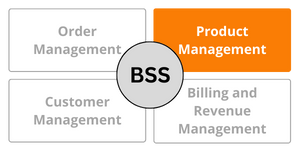
Product Management of the BSS
Product Management is responsible for defining, creating, and managing the services and products offered by the service provider. It is the gateway to service innovation, allowing providers to adapt to changing market demands and introduce new offerings.
Product Management aligns services with customer needs and preferences.
The key functions of Product Management within the Business Support System (BSS)
Product Catalog Management
Product Management maintains a comprehensive product catalog that defines all available services and offerings. This catalog includes detailed descriptions, pricing structures, and service bundles.
Pricing Management
Pricing strategies determine how services are priced, whether it’s a subscription-based model, pay-as-you-go, or tiered pricing. Pricing decisions impact revenue generation and market competitiveness.
Service Bundling
Product Management decides how services are bundled together to create attractive packages for customers. Bundling can include combinations of voice, data, and other services.
Promotion Management
Managing promotions involves creating and executing marketing campaigns, discounts, and special offers to attract and retain customers. Promotions are used to stimulate customer interest and boost sales.
Some other functions of Product Management
- Data Analytics
- Business Intelligence
- Environmental Compliance
- Social & Governance Compliance
- Policy Control and Charging
- Service catalog management
- Tariff management
- Subscription life cycle management
- Voucher life cycle management
The importance of Product Management within the Business Support System (BSS)
Product Management is the catalyst for service innovation and market competitiveness. It empowers service providers to respond to evolving customer demands, introduce new services, and stay ahead of the competition. A well-structured product management function enhances the provider’s ability to adapt to market dynamics.
Integration with Other BSS Components
Product Management closely collaborates with CRM to tailor services to specific customer segments based on their preferences and behaviors. It interfaces with billing systems to ensure that pricing structures align with the product catalogue. Additionally, it collaborates with order management to facilitate the provisioning of newly introduced services.
What is the Synergy of Business Support System (BSS) Components?

While each Business Support System (BSS) component serves distinct functions, they are interlinked and dependent on one another to ensure seamless business operations.
The synergy between these components is vital for service providers to deliver efficient services and maintain strong customer relationships. For more details about the synergy see here.
CRM and Billing and Revenue Management
CRM provides essential customer data that billing systems rely on to generate accurate invoices. Billing data, in turn, enriches CRM with financial insights, allowing for a more comprehensive view of customer relationships.
CRM and Order Management
CRM systems capture and manage customer interactions and preferences, which inform order management processes. A complete understanding of customers’ needs enables more accurate order processing.
CRM and Product Management
CRM systems provide valuable insights into customer behavior and preferences, which are used by product management to tailor service offerings. Personalized services enhance customer satisfaction and loyalty.
Billing and Revenue Management and Order Management
Billing systems rely on order data to accurately calculate charges for services. Order management ensures that services are provisioned in alignment with billing specifications.
Billing and Revenue Management and Product Management
Pricing and service offerings defined by product management are integrated into billing systems to support accurate billing. Pricing structures directly impact revenue collection.
Order Management and Product Management
Order management ensures that the services requested by customers align with the product catalog. This ensures that customers receive the services they expect.
What Impact has IoT on the BSS?
The Internet of Things (IoT) has transformed the traditional Business Support System (BSS) into a more dynamic and complex ecosystem. IoT generates massive volumes of data from connected devices, requiring BSS platforms to manage and process this information efficiently. Traditional billing models are evolving to accommodate usage-based, subscription-based, or event-driven billing for IoT services.
Additionally, IoT applications often operate across diverse industries, such as healthcare, manufacturing, and smart cities, which necessitates greater flexibility and scalability within the BSS to handle industry-specific requirements.
Lastly, IoT’s reliance on real-time analytics for monitoring device activity and usage demands integration with advanced data processing and visualization tools, making BSS a more sophisticated enabler of IoT services.
What Impact has Mobile on the BSS?
Mobile services have been a driving force behind the evolution of BSS, pushing it to adapt to the high expectations of modern consumers. Key impacts include the need for real-time billing and charging systems that can handle prepaid, postpaid, and hybrid payment models. Mobile services demand seamless customer relationship management (CRM), providing personalized experiences through targeted marketing, loyalty programs, and app-based self-service tools.
Additionally, the rise of mobile applications and digital-first interactions has emphasized the importance of omnichannel support, ensuring consistent customer experiences across platforms such as mobile apps, websites, and physical outlets. Mobile technology also drives the need for scalability within the BSS to support an expanding user base and rapidly changing data consumption patterns.
What Things are Special for IoT in relation to a BSS?
In the context of IoT, a BSS must address several unique challenges and opportunities:
- Massive Scalability:
IoT involves managing millions of connected devices, far exceeding the scale of traditional mobile services. - Diverse Billing Models:
IoT services often require innovative billing models, such as pay-per-use, recurring subscriptions, or usage-based tiers. - Device Lifecycle Management:
IoT devices have their own lifecycle, requiring integration with systems that track device activation, usage, maintenance, and decommissioning. - Cross-Industry Integration:
IoT often spans industries like logistics, agriculture, and automotive, requiring a BSS to handle diverse regulatory, operational, and service-specific requirements. - Real-Time Analytics: IoT relies heavily on real-time data for decision-making, demanding a BSS capable of processing and analyzing large data streams promptly.
What are the Main Differences Between a BSS for IoT and for Mobile?
There are significant differences between a BSS tailored for IoT and one designed for mobile services:
- Customer vs. Device Management:
Mobile BSS focuses on individual customers, while IoT BSS often handles device-centric accounts, including managing the relationships between devices, users, and businesses. - Billing Complexity:
Mobile BSS primarily deals with voice, data, and SMS plans, whereas IoT BSS needs to accommodate event-driven, consumption-based, and multi-party billing models. - Scalability Needs:
IoT BSS must support a vastly larger number of connections due to the sheer volume of IoT devices compared to mobile users. - Industry-Specific Customization:
IoT BSS often requires tailored solutions for specific industries, such as predictive maintenance for manufacturing or energy consumption tracking for utilities. - Security and Privacy:
IoT BSS must integrate more advanced security and compliance mechanisms due to the critical nature of IoT data and its implications for safety and privacy. - Real-Time Operations:
While mobile BSS supports real-time operations for user convenience, IoT BSS often requires real-time analytics and actions for mission-critical processes.
These distinctions highlight the need for specialized BSS platforms that can cater to the unique demands of IoT and mobile ecosystems.
The best Business Support System (BSS)
Determining the “best” BSS (Business Support System) solution is highly dependent on the specific needs, goals, and circumstances of your business. What might be the best solution for one organization may not necessarily be the best for another.
There is no such things as the best BSS since everybody has different demands and requirements. More importantly the choice of BSS solution should align with your business’s unique requirements and objectives. See also: How to select a BSS and OSS
The main difference between BSS and OSS?
What are the distinctions between OSS and BSS, delving into their unique characteristics, functions, and roles within the telecommunications industry? To put it simply, OSS covers the operations and network side of the telco, while BSS covers the business and customer side. See also: What are the differences between OSS and BSS.
Summary about the Business Support System (BSS)
In the complex landscape of telecommunications and service provisioning, Business Support System (BSS) form the backbone of operations. The four distinct components of BSS—Customer Relationship Management (CRM), Billing and Revenue Management, Order Management, and Product Management—work in concert to deliver efficient services, enhance customer experiences, and maintain financial viability.
The integration and synergy between these components are crucial for the success of service providers, enabling them to adapt to evolving market dynamics and build enduring customer relationships. In short with BSS as the foundation, service providers can navigate the competitive landscape with agility and innovation.






